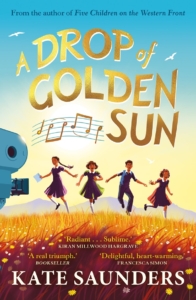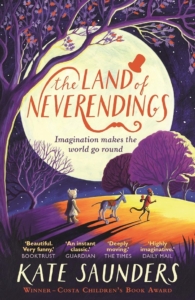
Kate Saunders
An appreciation by Nicholas Tucker
Kate Saunders’ last children’s novel, A Drop of Golden Sun, is published this month by Faber. Although in poor health before dying of cancer last April aged 62, she still managed to create all the humour, excitement and drama familiar from her previous stories. E. Nesbit, who provided the inspiration for Kate’s award-winning sequel Five Children on the Western Front, Noel Streatfeild and C.S. Lewis were all major influences on her throughout, warmly acknowledged in notes to young readers appended to her story Magicalamity. Like them, Kate always gave excellent value, plotting her stories intricately and taking her time. Catering for the tricky 9+ age-group, neither quite child nor teenager, she served up fiction generous in length, broad in humour and firmly positive in outlook.
Although she often turned to fantasy A Drop of Golden Sun takes place in the real world of 1973. Four British children find themselves selected for an American movie based on the real story behind The Sound of Music. This entails a long stay in France, where the film is being shot, with shy Jenny soon making friends with junior co-stars willowy Harriet, curly-haired John and irrepressible Belinda, the youngest and also at least to begin with the most irritatingly self-confident. Circling each other warily they soon meld, which is more than can be said for some of the adult stars. As in Noel Streatfeild’s immortal Ballet Shoes, there is plenty of technical detail, in this case concentrating on make-up procedures, lighting effects, costumes and the whole art of screen acting for children whose previous experience sometimes only extended to  the school play.
the school play.
Some of the accompanying parents or grandparents acting as chaperones cause trouble which has to be sorted out before an ending where everyone is happy and successful. What main characters may be thinking and feeling is always made abundantly clear for younger readers still happy to be led by the hand by an author so clearly on their side. This is a story that can be recommended without qualification. Great fiction it is not; enjoyable wish-fulfilment tempered by realism it most certainly is, with rural France and its wonderful cooking coming out as an almost equal object for more delightful daydreams.
 In 2017 Kate won the Costa Children’s Book Award for the second time with The Land of Neverendings. Nine-year old Emily is mourning the recent death of her severely disabled sister Holly. Her parents, in their own grief, are no longer any fun and Maisy, her previous best friend, is now distant. But Ruth, a neighbouring middle-aged antique dealer who had also lost a child, provides invaluable new company after the pair discover they are both able to summon characters to life previously existing only in their imagination. After that things run riot, and while mature readers may occasionally sigh at so many fart jokes their juniors may well enjoy these the most. At the story’s climax Emily comes to understand that while she can never summon back her sister to life, ‘Humans die but love never dies. And neither do stories.’ This advice is given to her by Sturvey, an old toy bear also given to quoting Shakespeare. Once again there is a triumphantly positive ending, with Emily starring in the school production of Alice, friends again with Maisy and no longer caught up in her other world adventures.
In 2017 Kate won the Costa Children’s Book Award for the second time with The Land of Neverendings. Nine-year old Emily is mourning the recent death of her severely disabled sister Holly. Her parents, in their own grief, are no longer any fun and Maisy, her previous best friend, is now distant. But Ruth, a neighbouring middle-aged antique dealer who had also lost a child, provides invaluable new company after the pair discover they are both able to summon characters to life previously existing only in their imagination. After that things run riot, and while mature readers may occasionally sigh at so many fart jokes their juniors may well enjoy these the most. At the story’s climax Emily comes to understand that while she can never summon back her sister to life, ‘Humans die but love never dies. And neither do stories.’ This advice is given to her by Sturvey, an old toy bear also given to quoting Shakespeare. Once again there is a triumphantly positive ending, with Emily starring in the school production of Alice, friends again with Maisy and no longer caught up in her other world adventures.
In an Afterword, Kate writes that inspiration for this story came from an episode in the life of C.S.Lewis when he and his brother Warnie decided as adults to bury their much-loved toys in the garden of the family house about to be sold. In this way they were neither thrown away nor given to other children. Kate understood this fierce love of old toys, adding that when she wrote she habitually kept company with the old bear plus toy penguin that belonged to her only son Felix. Already a promising writer and musician he suffered from clinical depression, finally taking his own life in 2012 aged nineteen. As a child he had always loved his mother’s stories about these two toys, and while suffering terribly after his death she was still able to come up with this emotional but finally hopeful story in which they appear once again.
Magicalamity, published in 2011 but still in print, is another favourite story, involving three aged fairy godmothers, each difficult in their own way. One runs a corrupt boarding school and is given to ‘pursing her lips in a thin streak of fury’, while another had married rich husbands eight times over, taking their money and then turning them into slaves a week post-honeymoon. But the third, Lorna, is good-hearted and makes a special friend of Tom, the pre-teenage main character who has just discovered that his father is in fact an escaped fairy on the run. Tom’s mother has also disappeared, only later rescued after having been transformed for her own safety into a sun-dried tomato. As a ‘demisprite’ Tom’s own continuing existence is now in peril, given that a menacing fairy world has no time for mixed race offspring. The stage is therefore set, with plenty of nice meals consumed in-between high adventure. Shakespeare is quoted again, along with references to Bach and Mozart. A happy ending sees everything right, and the many readers who loved this story could always move on to Beswitched. Published the same year but quite as entertaining, this tells the story of Flora, living in the present but somehow managing to swap lives with a 1935 schoolgirl.
Strikingly attractive and quick-witted, Kate for some years led a busy public life in journalism and on radio and television, playing the role of Policewoman Sandra in the BBC’s sitcom Only Fools and Horses. But life became progressively harder with the onset of multiple sclerosis in 1993, the same year her son was born. This was kept secret from all but a very few. Divorcing her husband Philip Wells but with whom she remained on good terms, she was still left with no savings. This eventually led to a move back to the family home where her increasingly necessary daily assistance was provided by a younger brother and sister. No longer as much in demand in the media or as an adult novelist, she concentrated instead on writing for children, only just getting by financially and sometimes not even managing that. But she never gave up, with her Belfry Witches children’s series later televised by the BBC. There were also some well received detective stories.
She continued up to her death to add to her stock of novels, finally amounting to twenty-six in total. To continue to have done so and always with such wit, energy and seemingly endless powers of invention was an extraordinary achievement from a truly remarkable person.
Nicholas Tucker is honorary senior lecturer in Cultural and Community Studies at Sussex University.
Books mentioned, all by Kate Saunders:
A Drop of Golden Sun, Faber Children’s Books, 978-0571310982, £7.99 pbk
Five Children on the Western Front, Faber Children’s Books, 978-0571342327, £7.99 pbk
The Land of Neverendings, Faber Children’s Books, 978-0571336562, £7.99 pbk
Magicalamity, Marion Lloyd Books, 978-1407137322, £7.99 pbk
Beswitched, Marion Lloyd Books, 978-1407108971, O/P




